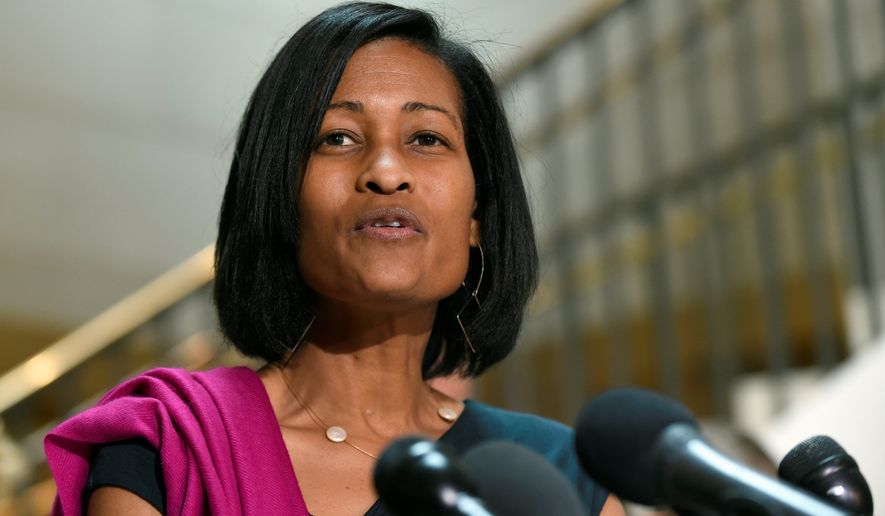FBI Director James B. Comey said Tuesday that his agency was nearing a deadline and had to offer Cheryl Mills, one of Hillary Clinton’s top aides, a limited immunity deal in order to get a peek at the former secretary of state’s secret emails and bring its investigation to a quick conclusion.
Mr. Comey, testifying to Congress, also said it was “not irregular” for Ms. Mills to then sit in as Mrs. Clinton’s attorney when FBI agents interviewed her this summer.
The director went further than he did before in clearing Mrs. Clinton of wrongdoing, saying his agency found no evidence that she broke any laws governing handling of classified data. In previous testimony, he said Mrs. Clinton did mishandle top-secret information but that prosecutors wouldn’t bring a case.
“We have no evidence that’s sufficient to justify conclusion that she violated any of the statutes with respect to classified information,” Mr. Comey told the Senate Homeland Security and Governmental Affairs Committee.
He will be back on Capitol Hill on Wednesday to testify to the House, where he is likely to face many of the same questions about his decision to clear Mrs. Clinton of criminal wrongdoing after she used an email server kept at her home in New York to send and receive highly classified information.
More recently, lawmakers have wondered why Mr. Comey granted immunity to so many of Mrs. Clinton’s aides and tech staffers, including Ms. Mills, when the agency was trying to make a case.
PHOTOS: See Obama's biggest White House fails
“No wonder they couldn’t prosecute a case,” Rep. Jason Chaffetz, Utah Republican and chairman of the House Oversight and Government Reform Committee, told The Associated Press after getting a look at the immunity agreements last week. “They were handing out immunity deals like candy.”
Jonathan Turley, a law professor at George Washington University, penned an op-ed for USA Today saying the Mills deal was particularly odd given that she also served as Mrs. Clinton’s personal attorney when the FBI interviewed the presidential candidate.
“Of all of the individuals who would warrant immunity, most would view Mills as the very last on any list,” Mr. Turley wrote.
Mr. Comey, though, said the immunity deals were proof of how far he and his agents went to try to pursue the case.
In the case of Ms. Mills, she was Mrs. Clinton’s chief of staff and consigliere at the State Department, but also served as Mrs. Clinton’s personal attorney when the former secretary belatedly agreed to comply with federal law by returning her work-related emails to the government. Ms. Mills helped review those emails to decide which ones should be returned.
The FBI found thousands of messages that should have been turned over that weren’t — in part by finding computers and devices of Mrs. Clinton’s aides. One of those was the laptop Ms. Mills used.
PHOTOS: The world's highest paid athletes for 2016
Mr. Comey said Ms. Mills’ own attorneys offered the laptop to agents in exchange for “act of production immunity,” which meant nothing the FBI recovered from her machine could be used to make a case against her.
The director said the alternative would have been to get a grand jury to subpoena the laptop, which he said could have ignited a yearslong legal fight because Ms. Mills was also acting as Mrs. Clinton’s attorney.
“The FBI judgment was we need to get to that laptop. We need to see what it is,” he said. “This investigation’s been going on for a year. And this was, in the negotiation, a tool that her lawyer asked for, that the Department of Justice granted so we could get the laptop.”
Others offered immunity included Bryan Pagliano, the Clinton campaign staffer whom she brought over to the State Department to operate the private server; Heather Samuelson, another of Mrs. Clinton’s attorneys and a former State Department employee; John Bentel, a former information technology official at the State Department; and Paul Combetta, an employee at Platte River Networks, the firm Mrs. Clinton hired to handle her server in its final days before wiping it clean.
Mr. Comey said the bureau offered immunity to Mr. Combetta to try to find out whether he was ordered to be part of a cover-up and found no evidence to back that up.
“The department granted immunity to the one fellow who erased the stuff so that we could figure out, did anybody tell you to do this, did anybody ask you do this, to see if we could make an obstruction case — we couldn’t,” he said.
Sen. Ron Johnson, Wisconsin Republican and chairman of the Senate Homeland Security Committee, ticked off a number of cases he said were similar to Mrs. Clinton’s in which a prosecution was launched.
“My concern when all is said and done with what Secretary Clinton did is that by not prosecuting anybody in this case we really do signal that we have a two-tiered justice system here,” he said. “And what is that going do in terms of other people that are charged with responsibility, properly handling classified information?”
Mr. Comey rejected that, saying recommending charges against Mrs. Clinton would have been treating her differently.
• Stephen Dinan can be reached at sdinan@washingtontimes.com.




Please read our comment policy before commenting.